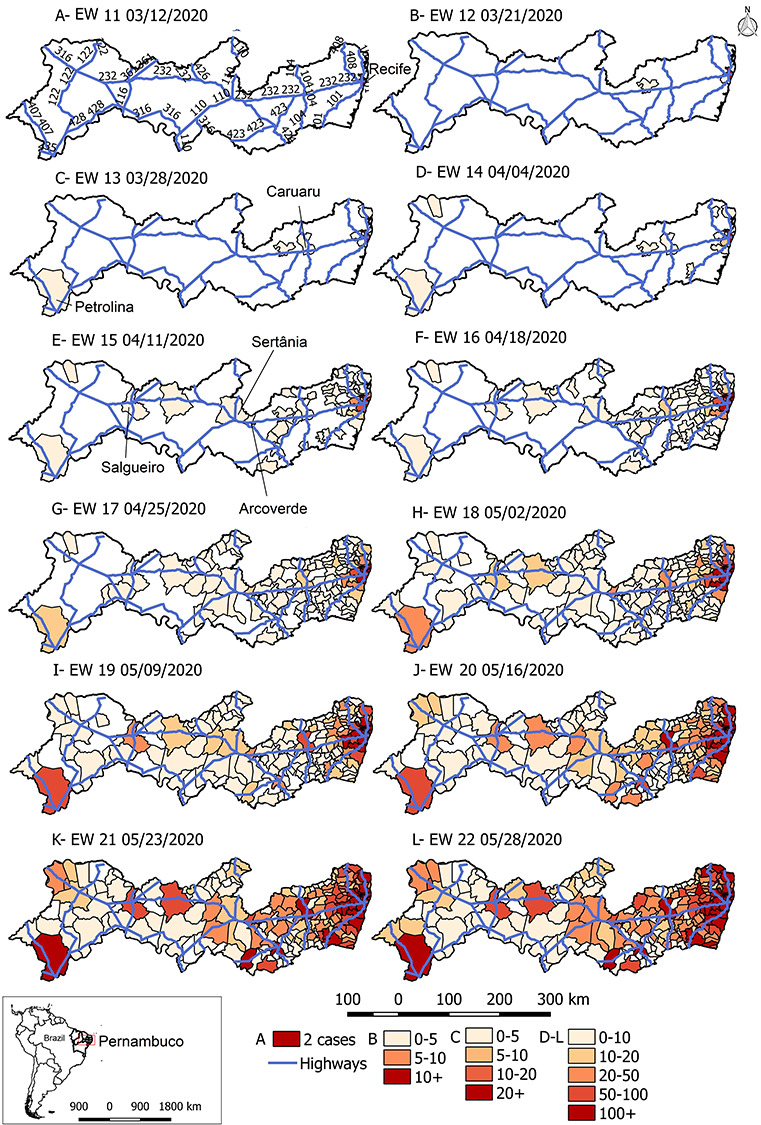The first cases of coronavirus disease 2019 (COVID-19) were reported in the People’s Republic of China and quickly spread across the world.1 The first case in Latin America was confirmed on 26 February 2020, in São Paulo, Brazil.2 Soon after the disease was detected, the number of cases and deaths increased daily, being Northeast Brazil one of the most affected regions, especially the state of Pernambuco, the second highest mortality rate in the country (36.4 deaths per 1 million population in April).3 We explore the importance of transportation routes in the process of expanding COVID-19 to the countryside of Pernambuco.
We conducted an ecological study involving all confirmed cases of COVID-19 registered in the state of Pernambuco between 12 March 2020, date of the first registered case and 28 May 2020. This period comprises 12 epidemiological weeks (EW), from 11th to 22nd. Data on confirmed cases were obtained from the Rede CoVida panel (https://covid19br.wcota.me/), population data were obtained from the Brazilian Institute of Geography and Statistics (https://sidra.ibge.gov.br/home/ipca15/brasil), the network of municipalities was obtained from the Brazilian Institute of Geography and Statistics (https://www.ibge.gov.br/geociencias/downloads-geociencias.html) and the highway network was obtained from the National Department for Infrastructure of Transportation (https://www.gov.br/dnit/pt-br). After data collection, an exploratory spatial analysis of the number of confirmed cases by municipality of residence was carried out according to EW.
The first confirmed case of COVID-19 in Pernambuco occurred on 12 March 2020 (EW 11) in the capital, Recife, located in the Atlantic coast. Recife has the busiest international airport, when compared with neighbour states (likely the entrance door). In EW 12 (21 March 2020), only three municipalities registered cases (Recife, Jaboatão dos Guararapes and Belo Jardim). In EW 13, the first cases of the disease are recorded in the state’s backlands (Petrolina) and in Caruaru (intersections of BR 232 and BR 104). From EW 14 onwards, there was a more sustained growth in the number of municipalities affected by COVID-19 as the interiorization process appears to follow the main highways, particularly BR 232. In EW 15, cases were registered in Arcoverde (BR 232 and BR 424), Sertânia (BR 232 and BR 110) and Salgueiro (BR 232, BR 116 and BR 361). On 28 May, Pernambuco totalled 30 713 cases of COVID-19, distributed in 177 municipalities (95.6%). A total of 26 municipalities had >100 confirmed cases and, together, were responsible for 87.9% (n = 26 998) of the state’s cases (Figure 1).
Figure 1.

Expansion of confirmed cases of COVID-19 in Pernambuco, Brazil, 12 March 2020 to 28 May 2020.
It is known that commercial flights were an important means of introducing COVID-19 in Brazil and subsequently played a role in interstate dissemination.4 Pernambuco capital confirmed the first case of COVID-19 in the state and may have contributed to the initial spread through local commercial flights. However, the sustained disease spread to the interior followed the BR 232 highway route. The highway is 563 kilometres long and cuts through Pernambuco from the coast to the hinterland (https://infraestrutura.gov.br/), being the main route for people who travel inward the state.
International routes should also be considered when assessing the COVID introduction and spread. Previous reports have shown a particular vulnerability in Brazil regarding potential unregulated international migration from neighbour countries and the consequent importation of vaccine-preventable diseases.5,6 It might also be true for other infectious diseases such as COVID-19.
Our results demonstrate that local transportation particularities play an important role in the relentless advance of COVID-19. While potentially carrying the virus, these routs may also be important in the essential goods chain supply. Knowing the disease migration pattern aids preventive actions to contain pandemic diseases.
Ethics approval and consent to participate
As this study used only secondary data in the public domain, it is not possible to identify the subjects. For this reason, Research Ethics Committee approval was waived.
Authors’ contributions
R.F.C and C.D.F.S conceived the study, carried out the analysis and drafted the first manuscript. All authors discussed the results, critically read and revised the manuscript and gave final approval for publication.
Financial support
None.
Funding
None.
Conflict of interest
None declared.
References
- 1. Zhu N, Zhang D, Wang W et al. A novel coronavirus from patients with pneumonia in China. N Engl J Med 2020; 382:727–33. doi: 10.1056/NEJMoa2001017 [DOI] [PMC free article] [PubMed] [Google Scholar]
- 2. Rodriguez-Morales AJ, Gallego V, Escalera-Antezana JP et al. COVID-19 in Latin America: the implications of the first confirmed case in Brazil. Travel Med Infect Dis 2020; 101613. doi: 10.1016/j.tmaid.2020.101613. [DOI] [PMC free article] [PubMed] [Google Scholar]
- 3. Souza CDF, Santana GBA, Leal TC et al. Spatiotemporal evolution of coronavirus disease 2019 mortality in Brazil in 2020. Rev Soc Bras Med Trop 2020; 53:e20200282. doi: 10.1590/0037-8682-0282-2020. [DOI] [PMC free article] [PubMed] [Google Scholar]
- 4. Candido DDS, Watts A, Abade L et al. Routes for COVID-19 importation in Brazil. J Travel Med 2020; 27:taaa042. doi: 10.1093/jtm/taaa042. [DOI] [PMC free article] [PubMed] [Google Scholar]
- 5. Tuite AR, Thomas-Bachli A, Acosta H et al. Infectious disease implications of large-scale migration of Venezuelan nationals. J Travel Med 2018; 25. doi: 10.1093/jtm/tay077 [DOI] [PMC free article] [PubMed] [Google Scholar]
- 6. Fujita DM, Salvador FS, Silva Nali LH, Albuquerque Luna EJ. Decreasing vaccine coverage rates lead to increased vulnerability to the importation of vaccine-preventable diseases in Brazil. J Travel Med 2018; 25. doi: 10.1093/jtm/tay100 [DOI] [PubMed] [Google Scholar]


